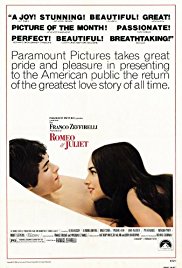1. After Romeo has killed Tybalt, Romeo cries out: “I am fortune’s fool.” What does Shakespeare intend to convey with these words?
Suggested Response:
Shakespeare is telling us that by giving in to raw instincts for revenge, Romeo has lost his ability to influence events. He is at the mercy of fortune. He dances to the tune of the fates.
2. What were the causes of the death of these lovers?
Suggested Response:
There are a number of good responses. They include the hatred that surrounded them; bad luck; poor choices by Romeo in killing Tybalt; poor choices by the lovers in committing suicide.
FIGHTING
3. In the Zeffirelli version: Notice the choreography of the fight between Romeo and Tybalt. Tybalt is getting the best of Romeo, but when Tybalt goes in for the kill, he leaves himself open for a moment. Romeo recovers just enough to take advantage of that opening, and Tybalt is slain. In Baz Luhrmann’s “Romeo + Juliet,” Romeo offers no resistance to Tybalt at the beach despite the fact that Tybalt beats him mercilessly. But when Tybalt leaves, Romeo follows him and suddenly attacks. Now it is Tybalt who is at disadvantage, and he is killed. Is this a realistic way in which fights can happen? What can we learn from these presentations of “Romeo and Juliet” about the risks of fighting?
Suggested Response:
Both fights are very realistic and show how risky fighting can be. In the Zeffirelli version, Tybalt has Romeo beaten but in the next second Tybalt is killed. In the Luhrmann version, Romeo is so badly beaten that Tybalt leaves, triumphant, only to be pursued by Romeo and killed. What we can learn from this is that fighting is very, very risky. You don’t know how it will turn out.
ROMANTIC RELATIONSHIPS
See Discussion Question #2 in the Discussion Questions section.
4. Have you ever felt a love so strong that it consumed all of your other relationships and all of your other interests? Is a love like this healthy? What are its risks, and what can people who are swept up in intense relationships do to balance their feelings and lives?
Suggested Response:
A love as strong as Romeo and Juliet’s is not healthy. Life is a multifaceted experience, and when we focus on one aspect of existence to the exclusion of all others, we risk tragedy. Moreover, this type of intense infatuation usually does not last — because it cannot last. To provide a balance of their feelings, people should also focus on other loving relationships with friends and family.
5. If Romeo or Juliet had close relationships with their parents or other members of their family, would they have been so quick to commit suicide?
Suggested Response:
The strength of the infatuation of Romeo and Juliet was probably a function of the poverty of the emotional resources of their families. People with strong relationships with family and friends will have a defense against this type of love.
SUICIDE
See the Quick Discussion Question.
6. What does the act of suicide say to your relatives and friends?
Suggested Response:
It says that they are not important enough for you to keep on living. It tells them that you do not love them enough to keep living.
REVENGE
7. Romeo killed Tybalt to avenge the death of Mercutio. As one character in Hamlet, Romeo took revenge for the killing of a loved one without thinking through the consequences. Who was the character, and what were the results of the acts of revenge in each case?
Suggested Response:
The character was Laertes. (Hamlet, when he stabbed the figure behind the curtain in his mother’s bedroom, is another possibility.) In each instance, the act of revenge was unthinking and brought tragedy and death to the person who committed it. Hamlet’s act in killing Claudius at the end of the play was not of this nature. See response to Question #9.
8. State the law of unintended consequences and give three reasons why it applies with particular force to acts of revenge.
Suggested Response:
The law of unintended consequences holds that whether or not what you do has the effect you intend, it will have consequences that you don’t expect and therefore consequences that you don’t intend. Some unintended consequences can be very unpleasant. Three reasons that the law of unintended consequences applies with particular force to acts of revenge are: (1) In any person’s life, acts of revenge are infrequent. Experience is an excellent teacher. If we have little experience with an action, our anticipation of the consequences will be less accurate than if we have taken the action frequently in the past. (2) Revenge usually affects a number of people, either directly or indirectly. Everyone is different, and when other people are affected by our actions, there is an increased risk that we won’t accurately predict how they’ll react. (3) Revenge is often taken in a rage or a fit of passion. Our actions are often not well considered when we are in such a state. Therefore, the risk that we’ll fail to anticipate some of the consequences is increased.
9. Compare the role of revenge in this play, with the part it played in Hamlet. What is Shakespeare trying to tell us about the revenge in both of these plays?
Suggested Response:
Shakespeare is trying to tell us that revenge leads to results we do not think of at the time and that are often tragic. Romeo, Laertes and Hamlet (when he stabs the figure behind the curtain in his mother’s bedroom) are committing reflexive unthinking acts of revenge. By the end of his play, Hamlet kills the King, not only for revenge but also for the larger purpose of ridding the state of a cancer. Claudius has demonstrated that he will infect anyone who comes near him and that he cares for no one except himself. For a more complete discussion of this interpretation, see Learning Guide to “Hamlet”





